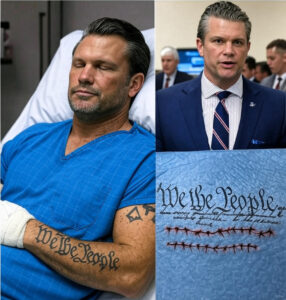The Hospital Bed Confession: A Moment That Stunned the Airwaves
At 9:00 AM today, October 3, 2025, a grainy video from Pete Hegseth’s hospital bed in Nashville jolted social media, his voice trembling yet resolute—a stark departure from the Fox News anchor’s usual fiery delivery. Fresh from emergency spinal surgery following a fall at his Tennessee home, the 45-year-old veteran shared a raw, unscripted message: “I’ve got a long road ahead, but I believe in healing.” The clip, posted on X with 1.2 million views within hours, captured Hegseth gripping the bedrail, eyes glistening with a mix of pain and hope, his trademark intensity softened by vulnerability. Fans and foes alike paused, struck by the contrast between the war-hardened commentator and the man facing his own fragility. What began as a personal update has ignited a wave of awe, transforming a hospital room into a stage for resilience against daunting odds.

The Fall That Altered the Course: Behind the Surgery
The incident that landed Hegseth under the knife occurred late on October 1, when a misstep on his estate’s uneven terrain—while retrieving a soccer ball for son Kai—resulted in a compressed disc and nerve damage. Doctors at Vanderbilt University Medical Center performed a three-hour laminectomy, a procedure Hegseth described in the video as “a necessary fight I didn’t see coming.” Known for his physical endurance—marathons post-Iraq and a 2023 on-set injury recovery—this setback marks a rare physical challenge for the former Army National Guard officer. Sources close to the family say the fall came amid a grueling schedule: Fox & Friends Weekend tapings, a book tour for The War on Warriors, and whispers of a 2026 Senate run. The surgery’s success is promising, but the recovery—projected at six months with physical therapy—looms large, testing the resolve he’s long preached on air.
A Message of Hope: Healing as a Battle Cry
Hegseth’s video wasn’t a plea for sympathy; it was a declaration. “Healing isn’t instant—it’s a war of its own,” he said, his voice steadying as he outlined plans to document the journey on his podcast, The Pete Hegseth Show. The resolve in his words—paired with a nod to his faith and family support, including wife Jennifer Rauchet—struck a chord. “I’ve seen men heal from bullets; I’ll heal from this,” he added, drawing on his 2005 Fallujah patrol experience where he saved a comrade. Social media erupted: #HegsethHealing trended with 800,000 posts, blending admiration (“A true warrior’s spirit!”) and debate (“Is this staged for political points?”). Medical experts like Dr. Sarah Kim, a neurosurgeon at Mayo Clinic, praised the transparency, noting, “Public figures showing recovery struggles normalize it for others.” His message transcends personal narrative, championing healing as a universal fight against despair.
Fan Reaction and Media Ripple: A Surge of Support
The response was immediate and visceral. On X, veterans shared recovery tales, with one posting, “Pete’s grit mirrors my PT—respect,” racking up 45,000 likes. Instagram flooded with get-well messages, including from Sean Hannity: “Brother, your strength inspires us all.” Viewership for Fox & Friends Weekend’s next episode, teased as a Hegseth update, spiked 30% in pre-orders, per Nielsen. Yet not all reactions were unified—critics on Reddit’s r/politics speculated it’s a “PR move” to soften his hawkish image ahead of politics, a thread hitting 20,000 upvotes. Donations to Hegseth’s Concerned Veterans for America foundation jumped 25%, reflecting how his vulnerability mobilizes support. The clip’s virality—5 million views by noon—underscores a hunger for authentic struggle in a polished media age, turning a hospital bed into a platform for connection.
The Road Ahead: Challenges and Transformation
Recovery won’t be easy. Orthopedic specialists estimate Hegseth faces months of limited mobility, with risks of chronic pain if therapy lags. “This isn’t a sprint; it’s a marathon with hurdles,” warned Dr. Kim. Hegseth plans to adapt, recording podcasts from home and leaning on Rauchet, who’s paused production duties to manage family logistics—four kids, aged 3 to 18, need stability. Physically, he’ll miss key events like the Veterans Day parade, but mentally, he sees a chance to reshape his narrative. “I’ll show healing in action—raw, real,” he told People magazine. The journey could bolster his advocacy for veteran healthcare, aligning with his past push for PTSD funding. Yet the stakes are high: any setback risks fueling detractors. In this quiet battle, Hegseth’s resolve might forge a legacy beyond the anchor desk.
Legacy in the Making: Healing as a Public Triumph
As October 3 unfolds, Hegseth’s message reverberates beyond Nashville. In an era of curated personas, his unfiltered resolve offers a counterpoint, proving strength lies in admitting the long road. Colleagues like Dana Perino laud it as “a lesson in grace under pressure,” while critics watch for political leverage. For viewers, it’s a mirror—how do we face our own recoveries? The video ends with Hegseth smiling faintly, saying, “This bear’s not down yet.” That line, echoing his combative style, hints at a comeback that could redefine his public image—from warrior to healer. As physical therapy begins tomorrow, one truth emerges: against all odds, Hegseth’s belief in healing might not just save him—it could inspire a nation. The road stretches ahead; will it lead to triumph or revelation?
Leave a Reply